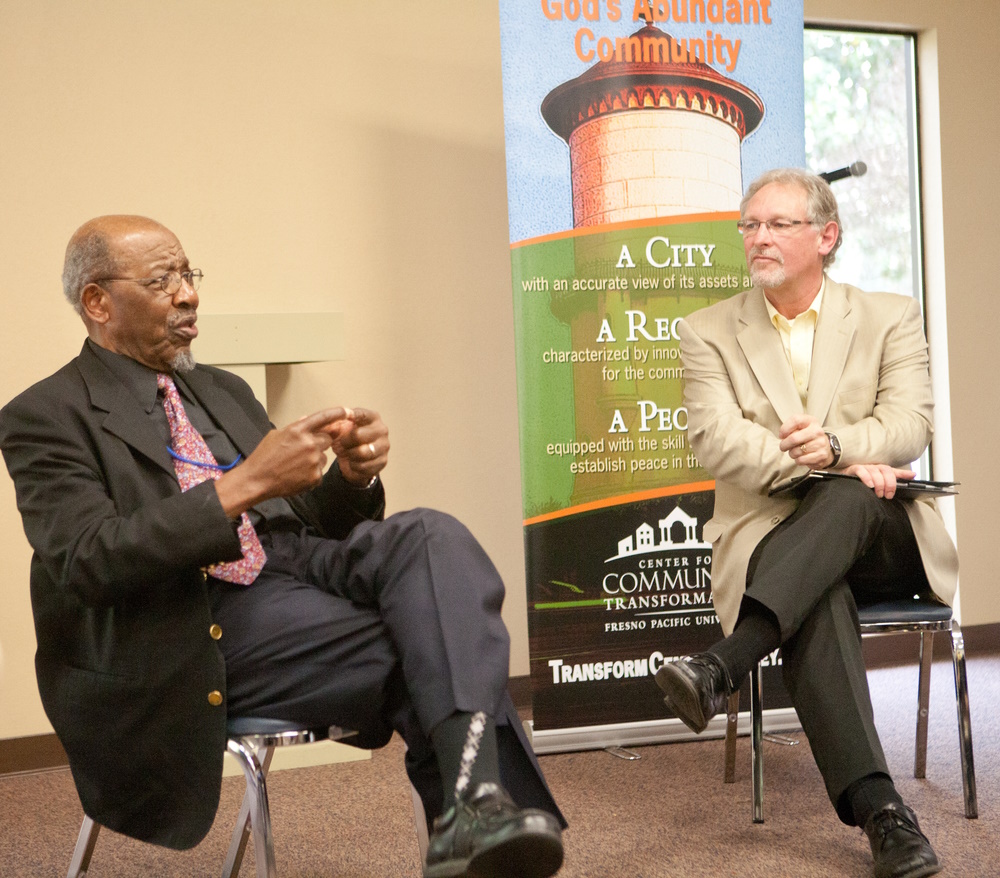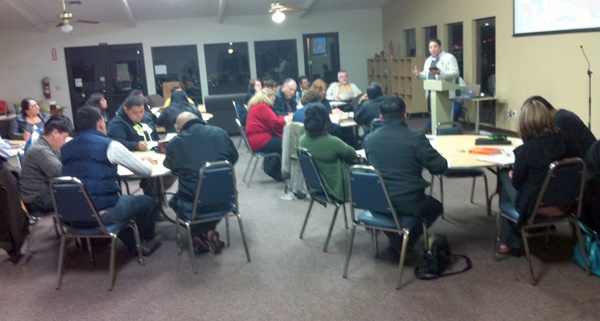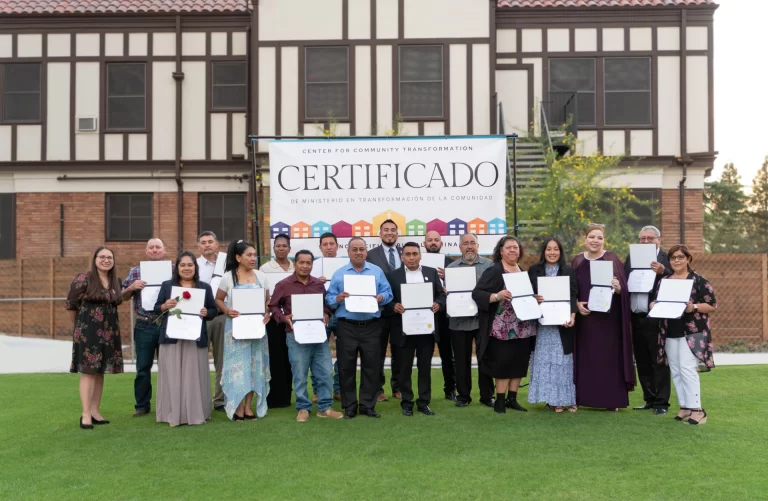SANKOFA: Looking back in order to look ahead
Historian/Urban theologian Ray Bakke famously said, “I’m not interested in where you think the church should go, unless you have a strong grasp on where the global church has been, and why.” This echoes the African word Sankofa, which means the past must serve as a guide for planning the future. As the FPU Center for Community Transformation (CCT) puts it, we look back in order to look ahead. This does not assume the mere preservation or repetition of the past, but rather the ability to learn from the successes and failures of previous generations, and discern a way ahead in wisdom. How were the values, the theology, and the particular initiatives of the CCT developed, and how will this history inform its future influence? In reviewing its ministry innovation in the last decade, what will drive it in its next? We look back in order to look ahead.
A decision at its founding in 2012 set the stage. It was the strategic choice to be an innovative organization with a redemptive purpose. Innovation is a redemptive response to the challenges of a changing landscape. Innovative organizations posture themselves to be able to nimbly respond to new realities on the ground.  They know where they come from, but are not wedded to the initiatives and practices that they once pioneered. “Date your ideas, don’t marry them,” was the favorite motto in the CCT’s early years. The only idea that a redemptive, innovative organization is married to is the command to “Seek the peace of the city to which I have sent you … and pray to the Lord on its behalf, for in its peace you will find your peace. (Jer. 29:7). This, and scriptures like it formed a broadly applicable theological foundation for its work. The description in Zechariah 8 of the city that God would heal as being one where the very young and the very old – society’s most vulnerable – will be safe, provided for, and experience enjoyment, sitting on their porches and playing in the streets. Urban practitioner H Spees felt that great cities should be judged by the way they treat their most vulnerable people. His way to get there? Unity. His challenge to the CCT was to “operationalize the unity of the body of Christ for the shalom of the community” These foundational philosophies based on sacred text provided the foundation for the CCT’s reason for existing, as well as giving it the mandate to focus on things that would lead to true peace in the city. Innovation became the modus operendi.
They know where they come from, but are not wedded to the initiatives and practices that they once pioneered. “Date your ideas, don’t marry them,” was the favorite motto in the CCT’s early years. The only idea that a redemptive, innovative organization is married to is the command to “Seek the peace of the city to which I have sent you … and pray to the Lord on its behalf, for in its peace you will find your peace. (Jer. 29:7). This, and scriptures like it formed a broadly applicable theological foundation for its work. The description in Zechariah 8 of the city that God would heal as being one where the very young and the very old – society’s most vulnerable – will be safe, provided for, and experience enjoyment, sitting on their porches and playing in the streets. Urban practitioner H Spees felt that great cities should be judged by the way they treat their most vulnerable people. His way to get there? Unity. His challenge to the CCT was to “operationalize the unity of the body of Christ for the shalom of the community” These foundational philosophies based on sacred text provided the foundation for the CCT’s reason for existing, as well as giving it the mandate to focus on things that would lead to true peace in the city. Innovation became the modus operendi.
How then did the CCT choose its initiatives and methods? By making a commitment in its earliest founding to listen to the community. When FPU asked us to start a “center” at the Seminary in 2012, they no doubt had something more academic in mind. A place that would sponsor symposia about various issues, conferences that would hammer out statements on social concerns, publish articles in theological or sociological journals, and possibly offer opportunities for students to volunteer. All good objectives, but clearly not the call of the CCT. But to their credit, they gave a long leash to the CCT’s initiatives, and allowed the deliberate creation of an organization that would create pragmatic initiatives in response to the felt needs of community members, and in collaboration with community partners and organizations.
LOOKING BACK: LISTENING IS GENERATIVE
What did this look like? In the CCT’s first year, five local, Spanish-speaking pastors came to it and asked a key question. Of the 520 churches in Fresno (at the time) how many are Spanish-speaking? (We didn’t know.) They answered 165. “Of those,” they asked, “How many would you say were led by pastors who had formal theological or leadership training?” (Again, we didn’t know.) They answered, “Fewer than 5%.” They asked, “What are we going to do about that?” (We loved the word “we.”) The outcome, after a year of collaborative work with them, was the creation of the Certificado in Transformational Leadership, a one-year training program helping Spanish-speaking pastors and lay leaders devise community transformation responses in their small urban and rural congregations, often embedded in our valley’s poorest neighborhoods. Ten years later, more than 143 leaders have now been fully trained with the skills they need to lead in ministries of transformation.
training?” (Again, we didn’t know.) They answered, “Fewer than 5%.” They asked, “What are we going to do about that?” (We loved the word “we.”) The outcome, after a year of collaborative work with them, was the creation of the Certificado in Transformational Leadership, a one-year training program helping Spanish-speaking pastors and lay leaders devise community transformation responses in their small urban and rural congregations, often embedded in our valley’s poorest neighborhoods. Ten years later, more than 143 leaders have now been fully trained with the skills they need to lead in ministries of transformation.
And it looks like this: The CCT kept hearing from pastors who had a stream of people coming to them in need, but all they felt they could do was refer them to social service agencies or hand out charity. Mayor Ashley Swearengin at that time was asking faith leaders in Fresno to consider what it would mean for churches to meaningfully engage the economic needs of residents in addition to their spiritual needs.

In response to that call and the voice of pastors seeking solutions, the CCT developed expertise in the area of helping churches, non-profits and faith-filled individuals to start businesses that would employ people with barriers or a that would accomplish a common good objective in the community. The Spark Tank Social Enterprise Pitch Fest and Academy was launched in 2013, and in the last ten years has stimulated the launch of 61 social businesses designed to bring transformation to people’s lives and communities. These include a coffee shop employing women in rehab, a landscaping company employing men coming out of prison, a retail store selling artisan crafts from people in developing countries, a childcare system focusing on kids with special needs, and many more.
And this: Some people came to the CCT and said, “Your Spark Tank process is great, but I don’t want to start a social business. I just got out of prison and want to start a business just to support my own family, but the current business incubators in the city aren’t designed for someone like me.” In response, the CCT began Launch Central Valley, a Christ-infused micro business training system, which has now helped to launch 103 in the valley, providing needed income for families trying to rebuild their lives. A man who had skills as a plumber but who did not know how to build his business. A woman who spent most of her adult life in prison, recently released, who had a vision for starting her own store that employed people coming out of incarceration. A coffee shop, a hair salon, a bookkeeping service. Economic shalom is developing in the lives of those who felt trapped.
And this: A local non-profit came to the CCT observing that so many of the people they were working with had no financial margin and were enslaved to payday lenders to manage any financial surprises that would inevitably come, such as an unexpected car repair or a rent increase. Payday lenders can charge up to 459% interest with combined fees. The CCT vetted a national faith-based financial literacy training that had been created expressly to deal with the unique pressures that low-income residents were facing, and became a major national hub for this training. Soon the training, though Christ-centered, was being used in local Housing Authority complexes as well as churches embedded in the valley’s poorest communities. To date, the CCT has trained 238 Faith & Finances facilitators, many of whom are helping people to repair their financial lives through biblical principles and community support. One woman, Josie, came into the training one night literally dancing. She was singing, “I’m never going back to those slaveholder payday lenders again. I’ve paid off my debt and I’m free!” CCT staff danced along with her.
observing that so many of the people they were working with had no financial margin and were enslaved to payday lenders to manage any financial surprises that would inevitably come, such as an unexpected car repair or a rent increase. Payday lenders can charge up to 459% interest with combined fees. The CCT vetted a national faith-based financial literacy training that had been created expressly to deal with the unique pressures that low-income residents were facing, and became a major national hub for this training. Soon the training, though Christ-centered, was being used in local Housing Authority complexes as well as churches embedded in the valley’s poorest communities. To date, the CCT has trained 238 Faith & Finances facilitators, many of whom are helping people to repair their financial lives through biblical principles and community support. One woman, Josie, came into the training one night literally dancing. She was singing, “I’m never going back to those slaveholder payday lenders again. I’ve paid off my debt and I’m free!” CCT staff danced along with her.
And it looks like this: In 2020 Lily Foundation Inc. honored the CCT with a $1 Million grant to boost its community transformation programs. In addition to several initiatives, this included adding a training series for English and Spanish-speaking workshops that equips leaders up and down the valley wanting to improve their institution’s transformational influence in their communities. The New Skills for a New Era convenings were born, and have now trained hundreds of such leaders, often working in the midst of some of the Valley’s most vulnerable communities. They are learning to help those communities identify their strengths and assets, building on them for transformational impact.
When an organization develops a track record as a redemptive, innovative organization, it gets invited into opportunities to affect systems for change. That’s why in 2022 the CCT was invited to help school districts in the valley link their schools to the very specific needs of their community’s residents through the Community Schools initiative, making schools into hubs and one-stop-shops of opportunity for students and their families. The CCT’s values-based, neighborhood-centered training is helping to change the paradigm of what education can accomplish, equipping them with the tools they need for the changing landscape of the future.
LOOKING AHEAD: VISION LEADS TO OPPORTUNITY
As the CCT matured as an organization, it learned the center of its vision held, even as needs and circumstances in the community changed. God sends people to cities to help them prosper, to be salt and light, to stimulate transformation, to seek the common good. (Jer. 29:4-7) Even as the CCT took on the new competencies and methodologies required to see transformation in the unique setting of the valley, the central vision never changed. It is the vision of what a restored city looks like, with the aged enjoying rest on their porches and children playing in the streets. A city, as H Spees has so beautifully described, “… where everything works, all of the time, and nobody gets left out.” Carlos Huerta, the Executive Director of the CCT, has embedded this specific vision deeply in the institution and decisions about future initiatives must emerge from it.
The North Star of that vision is compelling, and bright enough to lead the CCT to fulfill the role God is giving it, moving ahead. In what ways will that vision guide the organization to seek the shalom of the city given the most pressing needs of our context? Again, it involves a commitment to listen.
So, what is the CCT most currently hearing as it listens? One of the challenges its ministry partners are sharing is the relative absence of systematic leadership training for non-profit/community benefit organization program staff. Dozens of faith-based nonprofits in the valley add to their staff ranks by inviting volunteers into salaried positions, but do not have adequate training systems to onboard them. Many others do not have anything close to professional development to help staff grow as leaders. On top of this, many faith-based organizations have no way to assess the extent to which they are actually delivering the impact they are focused on. Still others are actually exploitative in their methodologies, and need to reevaluate the way they carry out their mission. To this end, the CCT is becoming certified in a national training system presented by Praxis to be able to offer “Redemptive Non-Profit Labs,” Christ-centered learning cohorts for non-profit organization staff. Imagine the impact as teams of qualified and trained non-profit and church staff fan out across the city, pursuing new, redemptive goals from the vantage point of their diverse organizations.
nonprofits in the valley add to their staff ranks by inviting volunteers into salaried positions, but do not have adequate training systems to onboard them. Many others do not have anything close to professional development to help staff grow as leaders. On top of this, many faith-based organizations have no way to assess the extent to which they are actually delivering the impact they are focused on. Still others are actually exploitative in their methodologies, and need to reevaluate the way they carry out their mission. To this end, the CCT is becoming certified in a national training system presented by Praxis to be able to offer “Redemptive Non-Profit Labs,” Christ-centered learning cohorts for non-profit organization staff. Imagine the impact as teams of qualified and trained non-profit and church staff fan out across the city, pursuing new, redemptive goals from the vantage point of their diverse organizations.
It is amazing what the discipline of listening leads to, especially when there is convergence between the voice of the scriptures and the voice of the community. Not only have solutions to the Valley’s most pressing social and economic problems emerged, but an institution has been created that has the ability, the agility and the spiritual commitment to keep the solutions coming, for the sake of God’s shalom.





